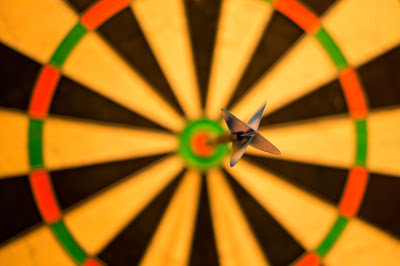Setting goals and objectives in life
- Get link
- X
- Other Apps
Setting goals and objectives in life is an important step in creating a sense of purpose and direction for yourself. Goals provide you with a clear target to work towards and a sense of accomplishment when you reach them. Objectives are specific, measurable, and actionable steps that help you achieve your goals.
When setting goals, it is important to be specific and clear about what you want to achieve. For example, instead of setting a goal to "lose weight," set a specific goal such as "lose 10 pounds in 3 months." This makes it easier to track progress and stay motivated. It is also important to set goals that are realistic and achievable, as setting unrealistic goals can lead to disappointment and discourage you from continuing to work towards them.
Another key aspect of setting goals is to make sure they are aligned with your values and what is important to you. This will help ensure that you are motivated to work towards them and that they will have a positive impact on your life. It's also important to set both short-term and long-term goals, as this will help you stay motivated and focused on both immediate and long-term accomplishments.
When setting objectives, it is important to ensure that they are specific, measurable, and actionable. Specific objectives should clearly state what is to be achieved and how it will be achieved. Measurable objectives should have a clear metric that can be used to track progress, such as a specific weight loss or a certain grade in a class. Actionable objectives should have a clear plan of action that can be taken to achieve them.
In addition to setting goals and objectives, it is also important to have a plan for achieving them. This includes identifying the resources and support that will be needed, as well as creating a timeline for reaching each goal or objective. It's also important to monitor progress and make adjustments as needed.
It's also important to stay motivated and stay on track when working towards your goals. This can include finding an accountability partner, writing down your goals, and rewarding yourself for reaching milestones.
It's important to reflect on your progress and adjust your goals and objectives as necessary. Life is constantly changing, and your goals and objectives should reflect that. Reflecting on your progress will help you to see what is working and what isn't, and make any necessary adjustments.
Setting goals and objectives is an important step in creating a sense of purpose and direction in life. It's important to set specific, realistic, and achievable goals that are aligned with your values, and to create specific, measurable, and actionable objectives to help you achieve them. Having a plan, staying motivated and on track, and reflecting on your progress are all important steps in achieving your goals and objectives.
Understanding the difference between goals and objectives
Goals and objectives are often used interchangeably, but they are not the same thing. Goals are general statements of what you want to achieve, while objectives are specific, measurable, and actionable steps that help you achieve your goals. Understanding the difference between the two can help you be more effective in setting and achieving your goals.
Goals are broad statements of what you want to achieve. They are often long-term and can be both personal and professional. For example, a goal might be to "lose weight," "start a business," or "buy a house." Goals are important because they provide a clear target for you to work towards and a sense of accomplishment when you reach them. However, goals can be difficult to achieve because they are often not specific enough.
Objectives, on the other hand, are specific, measurable, and actionable steps that help you achieve your goals. Objectives help to break down a goal into smaller, more manageable steps. For example, an objective for the goal of "losing weight" might be to "lose 10 pounds in 3 months" or "exercise for 30 minutes 3 times a week." Objectives are important because they make your goals more concrete and actionable. They also make it easier to track progress and stay motivated.
When setting goals and objectives, it is important to make sure that they are SMART. Specific, measurable, achievable, relevant, and time-bound. Specific objectives should clearly state what is to be achieved and how it will be achieved. Measurable objectives should have a clear metric that can be used to track progress. Achievable objectives should be realistic and achievable. Relevant objectives should align with your overall goals and values, and time-bound objectives should have a specific deadline.
It's also important to set both short-term and long-term goals. Short-term goals are those that can be achieved in a relatively short period of time, such as a few weeks or months. Long-term goals are those that will take longer to achieve, such as a year or more. Setting both short-term and long-term goals can help you stay motivated and focused on both immediate and long-term accomplishments.
Another key aspect of understanding the difference between goals and objectives is to identify the resources and support that will be needed to achieve them. This includes identifying any skills or knowledge that you may need to acquire, as well as any support or resources that will be necessary to achieve your objectives.
It's important to monitor progress and make adjustments as needed. This includes regularly reviewing your goals and objectives to ensure that they are still relevant and achievable, and making any necessary adjustments. Reflecting on your progress will help you to see what is working and what isn't, and make any necessary adjustments.
Understanding the difference between goals and objectives is important for setting and achieving your goals. Goals are general statements of what you want to achieve, while objectives are specific, measurable, and actionable steps that help you achieve your goals. Setting SMART goals and objectives, setting both short-term and long-term goals, identifying resources and support needed, and regularly monitoring progress are key steps in achieving your goals and objectives.
Setting effective goals and objectives
Setting effective goals and objectives is an important step in creating a sense of purpose and direction in life. Effective goals and objectives are specific, measurable, achievable, relevant, and time-bound (SMART). By setting SMART goals and objectives, you are more likely to achieve them and make progress towards your overall goals.
When setting goals, it is important to be specific and clear about what you want to achieve. For example, instead of setting a goal to "lose weight," set a specific goal such as "lose 10 pounds in 3 months." This makes it easier to track progress and stay motivated. It is also important to set goals that are realistic and achievable, as setting unrealistic goals can lead to disappointment and discourage you from continuing to work towards them.
Another key aspect of setting effective goals is to make sure they are aligned with your values and what is important to you. This will help ensure that you are motivated to work towards them and that they will have a positive impact on your life.
When setting objectives, it is important to ensure that they are specific, measurable, and actionable. Specific objectives should clearly state what is to be achieved and how it will be achieved. Measurable objectives should have a clear metric that can be used to track progress, such as a specific weight loss or a certain grade in a class. Actionable objectives should have a clear plan of action that can be taken to achieve them.
It's also important to set both short-term and long-term goals. Short-term goals are those that can be achieved in a relatively short period of time, such as a few weeks or months. Long-term goals are those that will take longer to achieve, such as a year or more. Setting both short-term and long-term goals can help you stay motivated and focused on both immediate and long-term accomplishments.
Another key aspect of setting effective goals and objectives is to have a plan for achieving them. This includes identifying the resources and support that will be needed, as well as creating a timeline for reaching each goal or objective. It's also important to monitor progress and make adjustments as needed.
It's also important to stay motivated and stay on track when working towards your goals. This can include finding an accountability partner, writing down your goals, and rewarding yourself for reaching milestones.
It's important to reflect on your progress and adjust your goals and objectives as necessary. Life is constantly changing, and your goals and objectives should reflect that. Reflecting on your progress will help you to see what is working and what isn't, and make any necessary adjustments.
Effective goals and objectives are specific, measurable, achievable, relevant, and time-bound (SMART). Setting both short-term and long-term goals, having a plan, staying motivated and on track, and reflecting on your progress are all important steps in achieving your goals and objectives. It's also important to align your goals and objectives with your values to ensure that they have a positive impact on your life.
Overcoming obstacles and staying motivated
Overcoming obstacles and staying motivated are important aspects of achieving your goals and objectives. Obstacles can come in many forms, such as lack of resources, lack of knowledge, or personal challenges. Staying motivated can be difficult, especially when progress is slow or when you encounter setbacks. However, with the right mindset and strategies, you can overcome obstacles and stay motivated on your journey towards achieving your goals.
One key strategy for overcoming obstacles is to break them down into smaller, more manageable parts. This can help to make the obstacle seem less daunting and more manageable. For example, if you are trying to lose weight and the obstacle is a lack of knowledge about nutrition, you can break it down by learning about a new healthy food each week or researching a healthy recipe.
Another key strategy for overcoming obstacles is to seek out resources and support. This can include talking to a mentor or coach, joining a support group, or seeking out educational resources. Having the support and resources you need can help you to overcome obstacles and achieve your goals.
One of the most important strategies for staying motivated is to set specific, measurable, achievable, relevant, and time-bound (SMART) goals and objectives. This can help to keep you focused and motivated on what you want to achieve. Additionally, setting both short-term and long-term goals can help you stay motivated and focused on both immediate and long-term accomplishments.
Another key aspect of staying motivated is to find an accountability partner. This can be a friend, family member, or colleague who will help you stay motivated and on track. Having an accountability partner can help you to stay accountable for your actions and make progress towards your goals.
Rewarding yourself for reaching milestones is also a great way to stay motivated. This can include treating yourself to a special meal or activity, or even buying yourself a small gift. Recognizing your progress and rewarding yourself can help to keep you motivated and focused on your goals.
It's also important to stay positive and keep a growth mindset. Instead of focusing on what you can't do, focus on what you can do. When you encounter setbacks or obstacles, try to see them as opportunities for growth and learning. This can help you to stay motivated and continue moving forward.
Overcoming obstacles and staying motivated are important aspects of achieving your goals and objectives. Breaking down obstacles into smaller, more manageable parts, seeking out resources and support, setting SMART goals, having an accountability partner, rewarding yourself, staying positive and having a growth mindset, and reflecting on progress are all key strategies for overcoming obstacles and staying motivated. It's important to remember that setbacks and obstacles are a normal part of the journey, and staying motivated and focused can help you to achieve your goals and objectives.
- Get link
- X
- Other Apps



